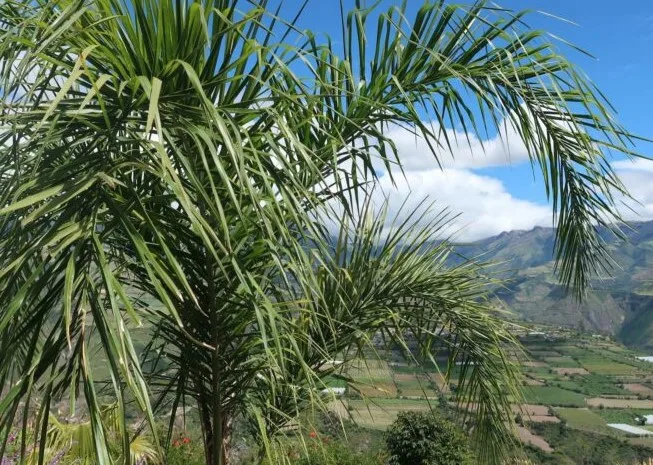Endangered birds have a new habitat in Ecuador
By Susana Madera
Two endangered birds, the golden-cheeked parakeet and the yellow-eared parrot, will soon have a new habitat in Ecuador’s Montaña de Luz, where the community has planted more than 300 wax palms, home to the tiny birds.
Due to its slow growth, the wax palm requires more than 80 years to begin its reproductive cycle and can exceed 200 years of age. Currently the Red Book of endemic plants of Ecuador considers it to be a vulnerable species.

Due to its slow growth, Ecuador’s wax palm requires more than 80 years to begin its reproductive cycle and can exceed 200 years of age.
It can be found in mature and secondary forests, and according to the Ministry of Environment, Water and Ecological Transition, it provides food for toucans, guans, and parrots, among other birds, and animals such as armadillos, bears, deer, peccaries, rodents, and primates.
And it is also the home of the golden-cheeked parakeet (leptosittaca branickii), an endagered bird according to the red list of birds of Ecuador 2022, and the yellow-eared parrot (ognorhynchus icterotis), which the International Union for Conservation of Nature places is in the vulnerable category and also appeared in the red list of birds of Ecuador 2019 in the critically endangered category.
To recover areas affected by the gradual reduction of wax palms, since 2012, the Ministry has reforested seven hectares in the cantons of Pallatanga and Colta, in the province of Chimborazo. The wax palms can also be found n Loja and Zamora Chinchipe, among others.
Today, at the top of what was once a rugged hill, now converted into the Montaña de Luz in the province of Imbabura, the branches of hundreds of wax palms can be seen in the distance.
“A few years ago, they were still small, and we see that they have accelerated growth. Now we see they’re almost three meters tall,” said Carlos Merizalde, former director of International Cooperation of the Imbabura Geopark.
The expert expressed his optimism about the future results of the planting: “It’s fantastic because very soon we will indeed have parrot families visiting us.”
“This environment is the right one for biodiversity to flourish again,” he said, adding that, up until about six years ago, the Montaña de Luz was a scrubland full of bushes and now it’s transformed into a “living laboratory” with about 30,000 plants of different species and varieties, on about 40 hectares in the rural locality of Pablo Arenas.
“Examples like Montaña de Luz will surely give us the impulse encourage the conservation and care of this species,” said Merizalde.
Merizalde recalled that the Ministry of Environment deploys a campaign yearly so that people do not use wax palms in the Christian celebration of Palm Sunday during Holy Week.
“It has been a bad habit of the community to cut down the palms and to remove the branches and sell them,” he said, adding that they also used to be used frequently in religious ceremonies, in the elaboration of incense, and to cure bad energies.
The environmental authority proposes alternatives to create bouquets with other elements (bay leaves, corn, straw, myrtle, cypress, cedar, bamboo, sigse, and ornamental flowers) without losing the religious tradition.
In addition, thousands of volunteers have been trained to help control the illegal trade of wax palm in Ecuador, where the penal code punishes those who extract, trade or transport wild species with economic fines and up to three years in prison.
But beyond the punitive aspect, Merizalde values, above all, the interest of individuals in creating a “new culture of respect for nature” and in thinking about the present with a perspective for the future and with investments and the active participation of the community, as in the Montaña de luz.
_____________________
Credit: La Prensa Latina





















